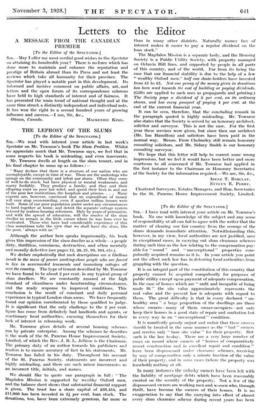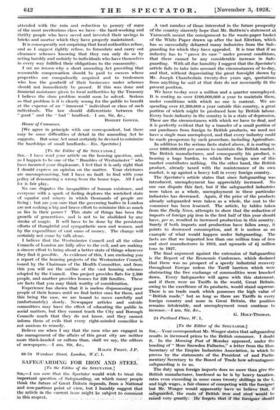[To the Editor of the SPECTATOR.]
have read with interest your article on Mr. Townroe's book. No one with knowledge of the subject and any sense of responsibility at all can fail to agree with the writer that the matter of clearing our fair country from the scourge of the slums demands immediate attention. Notwithstanding this, however, in my view, local authorities are not justified, save in exceptional cases, in carrying out slum clearance schemes during such time as the law relating to the compensation pay- able for " sound " and " unexceptional " properties com- pulsorily acquired remains as it is. In your article you point out the effect such law has in deterring local authorities from grappling with the question.
It is an integral part of the constitution of this country that property cannot be acquired compulsorily for purposes of public utility except upon payment of adequate compensation. In the case of houses which are " unfit and incapable of being made fit" the site value approximately represents the real value and the present law is adequate with regard to them. The great difficulty is that in every declared " un- healthy area " . a large proportion of the dwellings arc those whose owners—many of them owner-occupiers—not only keep their houses in a good state of repair and sanitation but in every way in an " unexceptional " condition.
It is manifestly grossly unjust and unfair that these owners should be treated in the same manner as the " bad " owners and receive only " bare site value " for their property. But such is the law to-day. There arc a very large number of cases on record where owners of " houses of comparatively recent construction and in .excellent repair and condition P have been dispossessed under clearance schemes, receiving by way of compensation only a minute fraction of the value of their property, and in some cases (where the property was leasehold) nothing at all.
In many instances the unlucky owners have been left with the liability of mortgage debts which have been reasonably created on the security of the property. Not a few of the dispossessed owners are working men and women who, through thrift, have become the owners of their homes. It is no exaggeration to say that the carrying into effect of almost every slum clearance scheme during recent years has been
attended with the ruin and reduction to penury of some of the most meritorious class we have—the hard-working and thrifty people who have saved and invested their savings ill bricks and mortar which they have properly maintained: - It is consequently not surprising that local authorities refuse, and as I suggest rightly refuse, to formulate and carry, out clearance schemes knowing that they can only do so by acting harshly and unfairly to individuals who have themselves in every way fulfilled their obligations to the community.
I see no reason why a short amending Act providing that reasonable compensation should be paid to owners whose properties are compulsorily acquired and to tradesmen who lose the goodwill of their businesses under schemes should not immediately be passed. If this was done and financial assistance given to local authorities by the Treasury I believe the slum problem would soon be solved. Serious as that problem is it is clearly wrong for the public to benefit at the expense of an " innocent " individual or class of such individuals. The law should differentiate between the good " and the bad landlord.--I am, Sir, &c., ROBERT GOWER.
House of Connnons.
[We agree in principle with our correspondent, but there may be some difficulties of detail in the amending Act he suggests. But some Act must certainly be devised to minimize the hardships of small landlords.—En. Spectator.]



















































































































 Previous page
Previous page